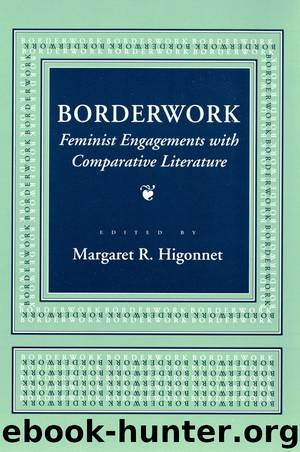Borderwork by Margaret R. Higonnet

Author:Margaret R. Higonnet
Language: eng
Format: epub
Publisher: Cornell University Press
Published: 2017-12-22T00:00:00+00:00
“My Seared Vision! My Crippled Strength!“
Jane Eyre appears to be the epitome of the family romance: the orphan child, raised in a hostile counterfamily, freed imaginatively to dream of alternative familial contexts, to transform those dreams into fictions and those fictions into autobiography. As she sits in her window seat, Jane dreams her way into the family, only to realize that she is “less than a servant,” brutally and unfairly cast out of their midst. Yet her healthy sense of injustice, coupled with her firm knowledge of her legitimacy, with her class affiliation, and with her education—a security that appears to be unshakable, resistant even to abuse and confinement—enhances Jane’s freedom to imagine as well as her ability to analyze her situation and to speak out assertively against it. With father and mother dead, then, and with this combination of class security, clear-cut mistreatment, and, later, her education, Jane can fantasize various family romances. Her fantastic analysis of her situation appears most vividly in the dream-paintings Rochester later so admires, paintings that give us an insight into her “inward eye” and the familial landscapes it can dream up (109–11). The first, a drowned female corpse whose arm sticks out of the water below a powerful cormorant who holds her gold bracelet is perhaps her dead mother, marked by the sign of economic security representing female victimization and masculine dominance. The second, a soft pastel female bust with stars in her hair and dark, wild eyes, is clearly an alternative maternal figure of her imagination, an angry mother-goddess perhaps. The third, a colossal diademed head with hollow, despairing eyes, draped in a dark turban, could represents a patriarchal specter whose power she challenges and whose vitality she removes: his ring is of white flame, and his sparkles have a lurid tinge.
Jane is motherless, and indeed Bronte replaces the mother with other parental figures. Jane is not unnurtured: Bessie, Miss Temple, Helen Burns, the memory of Mr. Reed all contribute to her relative psychic security, although none assumes an importance she cannot fantasize herself away from. She even enjoys the spiritual nurture of the moon, which appears to her on a number of occasions as an alternative presence to the Christian spirituality represented in the novel by St. John. Until we get to Rochester, the novel conforms perfectly to the female family romance pattern: Jane is an orphan; her father’s family’s economic status is uncertain, but her mother’s identity and position is cer-tissima. Even though she is told that she is less than a servant, she knows to assert her right to be treated as an individual, and her individuality is firmly upheld by the class allegiance she can claim through maternal certainty. In the Reed household, as well as later at school, at Thornfield, and at Marsh’s End, Jane has the opportunity to fantasize various familial configurations that would improve her condition. Through those fantasies Jane develops the imagination that so characterizes her.
But in Brontë’s novel Edward Rochester is not the fraternal man-who-would-understand.
Download
This site does not store any files on its server. We only index and link to content provided by other sites. Please contact the content providers to delete copyright contents if any and email us, we'll remove relevant links or contents immediately.
| Ancient & Classical | Arthurian Romance |
| Beat Generation | Feminist |
| Gothic & Romantic | LGBT |
| Medieval | Modern |
| Modernism | Postmodernism |
| Renaissance | Shakespeare |
| Surrealism | Victorian |
4 3 2 1: A Novel by Paul Auster(12352)
The handmaid's tale by Margaret Atwood(7726)
Giovanni's Room by James Baldwin(7297)
Asking the Right Questions: A Guide to Critical Thinking by M. Neil Browne & Stuart M. Keeley(5734)
Big Magic: Creative Living Beyond Fear by Elizabeth Gilbert(5721)
Ego Is the Enemy by Ryan Holiday(5386)
The Body: A Guide for Occupants by Bill Bryson(5064)
On Writing A Memoir of the Craft by Stephen King(4909)
Ken Follett - World without end by Ken Follett(4703)
Adulting by Kelly Williams Brown(4549)
Bluets by Maggie Nelson(4533)
Eat That Frog! by Brian Tracy(4497)
Guilty Pleasures by Laurell K Hamilton(4417)
The Poetry of Pablo Neruda by Pablo Neruda(4077)
Alive: The Story of the Andes Survivors by Piers Paul Read(4009)
White Noise - A Novel by Don DeLillo(3987)
Fingerprints of the Gods by Graham Hancock(3974)
The Book of Joy by Dalai Lama(3958)
The Bookshop by Penelope Fitzgerald(3826)
